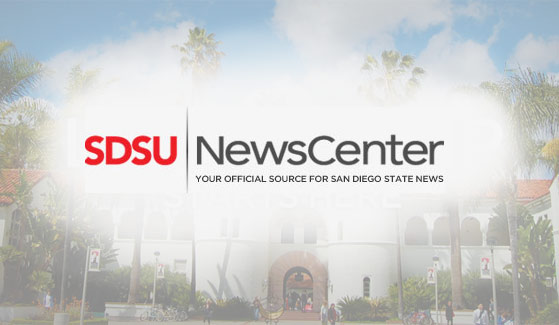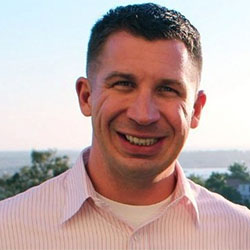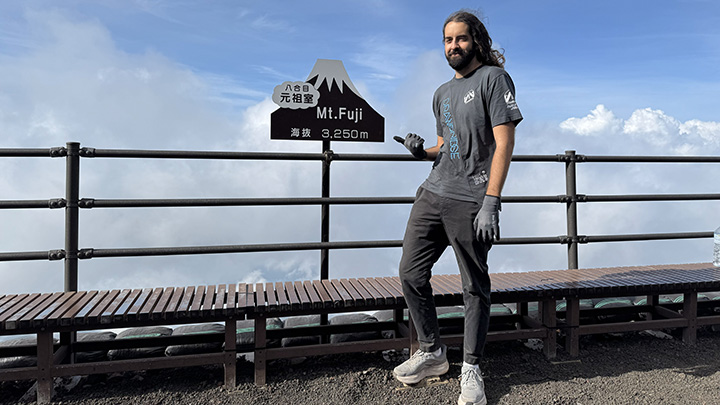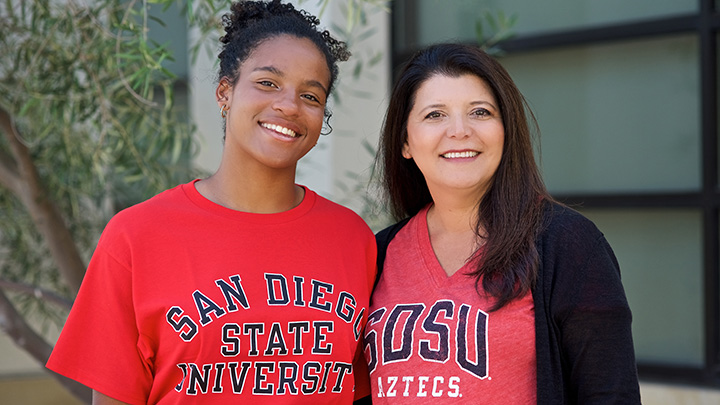7 Things About Derek Abbey
Abbey is passionate about making the student experience positive for veterans.

Derek Abbey is an assistant military liaison officer in San Diego State University's Joan and Art Barron Veterans Center.
He is responsible for outreach to veterans and active duty military worldwide to include local military bases and community colleges. He was hired to enhance and broaden the Basic Training in Higher Education program at military bases in San Diego County to ensure college/university information is being presented to the maximum number of prospective students possible.
Abbey studied higher education leadership at the University of San Diego where he focused on the relationships between institutions of higher education and student veterans. Additionally, he was an officer in the Marine Corps and retired in May after 23 years of service.
1. What inspired you to do this kind of work?
As a retired Marine, I have a direct connection to the military community. Additionally, while I was working on my masters, I conducted a significant amount of research related to veterans in higher education. For that research I wrote a case study on the veterans program at SDSU and produced a thesis titled "Best Practices for Institutions of Higher Education to Better Embrace Veterans as a Community and Culture." I fell in love with the subject matter and took it upon myself to find ways to contribute. With that I’ve consulted various institutions and programs on strategies in working with veterans and military connected students.

I am passionate about helping these students and potential students realize and make true their educational goals.I can connect to the struggle of understanding what can be a convoluted higher education process to those that have not been around university systems.
When I graduated high school I knew I wanted to go to college, but didn’t know how to get there. There were not a lot of people around me to answer the questions I needed answers to. I find many of those I deal with struggling with the same problems. Unfortunately, students today also have to deal with those that are trying to take advantage of them. This further motivated me to get these students the right answers to their questions.
2. How long have you worked at SDSU?
I started working at SDSU in May of this year.I finished my 23-year career in the Marine Corps in North Carolina and immediately relocated to San Diego to start this job and begin working on a doctorate in leadership studies at the University of San Diego.
3. What is the best piece of advice you have ever received?
Although I cannot remember where I got the message from, I use these simple pieces of advice to guide my life regularly.
“Set goals” — Set goals in every aspect of your life. Set many goals, short term, long term and everything in-between. Then set out on a course to attain them. Once they are attained, set new ones.In achieving each of these goals, you will build the confidence and capabilities to achieve greater things.
“Give” — Find a way to give to those around you.Actively use the gifts that you have to contribute to making your sphere of influence better.This could be in any fashion.If you have a special knowledge or skill, use it to make the world a better place, even in the smallest way.
4. What is your favorite thing about your job?
I absolutely love my job here at SDSU and the people I work with. They are fully committed to what they do. The message of value that SDSU sends to the student veterans and military connected students, both on campus and in the greater community, is genuine and authentic. It is great to just be a part of that.
5. What about your field or position do you think would surprise people the most?
The sheer number of people that I interact with and the reach of that interaction. I talk and work with people around the world every day. The number of military connected individuals in San Diego is significant, but I also work with prospective students where they are at.That could be anywhere across the country but also on deployments throughout the world.I regularly work with sailors out on ship in various places around the world and many forward on deployments in austere conditions trying to plan their next step in education.
6. What is the most interesting or surprising thing about you?
I spend a lot of my free time researching and searching for Americans Missing in Action (MIA) from World War II as member of a group called the BentProp Project. Each year these effort takes us to the island nation of Palau where we search the waters and jungles of the country for those lost. The BentProp Project has been successful in these efforts which have resulted in the repatriation of several missing Americans.
I am also an avid runner and am currently attempting to run a marathon in all 50 states.I just finished my tenth state last month.I’m considering running Alabama and Mississippi next month.
7. If you could only rescue one thing from your burning office, what would it be?
I share an office with my coworker Frank, so I would grab him. Beyond that I don’t keep a lot in my office, so I would grab my favorite leather bag.I love that bag and it has my computer in it which has my assignments on it.I need to make sure I can turn my assignments in.My professors would never believe my office burnt down.



